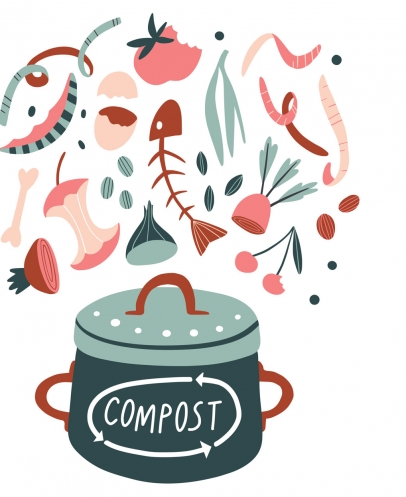The End Game for Food Scraps
Reducing Food Waste is Good for Business
Pivoting the conversation from food waste to financial savings provided just enough incentive for Chris Bender, co-owner of Newport’s Stoneacre Brasserie and Stoneacre Garden, to tiptoe into commercial composting. After discovering that separating discarded veggie and meat scraps, paper and other compostable waste from the businesses’ regular trash didn’t disrupt daily kitchen operations as he had anticipated, he jumped in with two feet. And now composting is helping his bottom line.
“We get stuck in the ‘what I can’t put in my compost at home’ mind-set, [which disqualifies things] like bones. But in a restaurant, we can add just about anything. That’s a game changer,” Bender says. “In our day-today service, so many products we already used are now sustainable or biodegradable, like paper straws or napkins. Everything is compostable now.”
A NUMBERS GAME
Bender’s Newport restaurants have joined the growing cadre of food service businesses across the state that are composting food scraps and more. While the practice might seem cumbersome and expensive, especially to smaller establishments with barebones staff and budget, the environmental, financial and social benefits prove that composting is worthwhile.
Advocates say change can’t come soon enough. National food waste nonprofit ReFed reports that 34.7 thousand tons of surplus food was generated by Rhode Island food service establishments in 2019. This represents a $432 million value, 8.48 billion gallons of water and 57.6 million meals sent to the state landfill in Johnston (which may close by 2036 if habits persist). Approximately 30% of the material currently entering the landfill is compostable, and even the United Nations supports a 50% reduction in food waste by 2030 to mitigate climate change.
NEVER FEAR
“As a provider of food, we have an obligation to ensure there is less waste and that we use sustainable products,” Bender says. “But people are generally resistant. We ourselves had a desire, but it took time to get over the hump getting started.”
That’s where programs can help, including Healthy Soils Healthy Seas Rhode Island (HSHSRI), Zero Waste Providence (ZWP) and the Center for EcoTechnology (CET). Eva Touhey, program manager for HSHSRI, the composting program of nonprofit Clean Ocean Access (COA), discusses composting options with restaurants, cafés, caterers and coffee shops to help them consider alternative food recovery and waste disposal methods.
“Any conversation we have with someone new, where they come away with an appreciation that they can work together or learn something about composting, is a success,” Touhey says. “It’s a high priority for many businesses. It saves money. It makes them look good. People want to eat at businesses that are community minded, environmentally minded.”
DEGREES OF SEPARATION
Coryanne Mansell of CET, a Massachusetts-based nonprofit that helps people and businesses save energy and reduce waste, offers support to HSHSRI participants like Stoneacre, including workshops, resources, technical assistance and recommendations to implement or expand recycling services.
“There are opportunities to build awareness, inspire action and support the solution providers while helping drive the marketplace,” Mansell says. “There are lots of businesses that want to find solutions and implement these programs, and we can help them address barriers.”
Bender worked with COA and CET to integrate compost bins into kitchen routines. They trained kitchen staff on knife skills to reduce waste and used bilingual posters so seasonal employees could learn, too.
Over time HSHSRI pickups, operated through The Compost Plant out of Smithfield, increased from once a week to three or four. The volume and odor that once demanded frequent trash pickups declined, and Bender says there is a surprisingly low amount of regular garbage. When he sees food wasted, he contemplates potential misuse or overordering, and adjusts inventory accordingly. Suddenly the simple act of reconsidering leftovers has had a domino effect on the way Bender orders, prepares, serves and disposes of food.
“By default, we have lower food cost and less food waste. We save a little overall, and mitigated our monthly compost bill by reducing monthly trash pickups. We mitigate further costs through efficient ordering, and donating more, which gives us charitable tax credits,” Bender says. “We started out thinking it would cost us. But by going all in with composting and recycling, we’re actually saving and having a positive financial benefit to business and community.”
URBAN INITIATIVES
Zero Waste Providence (ZWP), a volunteerled environmental advocacy group, is striving to double its commercial partners from 50 to 100 by next year, and is lobbying for paid community collection sites, arguing that one of the best ways to deal with food waste is to have urban sites where residents can drop off scraps.
“We need to figure out how to give businesses and residents incentive to do this. If the residential collection sites are successful, the City has indicated it may make them free. But if they’re free, maybe they’ll be [more] successful. It will save Providence money in the end if these food-scrap collection sites get used,” says ZWP Volunteer Coordinator Jenny Wieting. “I wish more businesses were less afraid. The past few years have been challenging, as they’re concerned about the bottom line. But there are affordable ways for restaurants to make this happen.”
LONG-TERM GAIN
The benefits extend to the environment, too. Touhey says diverting food scraps will prolong the life of the landfill, where the scraps rot and create methane, which is the leading greenhouse gas contributing to climate change. If food scraps can go to a farm and be made into finished compost material, she says, it could have another life.
“HSHSRI is making the connection between composting and ocean health. Using compost in gardens and as soil amendment can affect water quality. Finished compost is very absorbent, like a sponge; it can retain so much more water than dirt or soil. When we have an insane amount of rain, compost holds the water instead of letting it run through. Otherwise, pollutants from fertilizer or roads get washed into the street, into storm drains and into saltwater bodies. So, using compost can help to reduce stormwater runoff as a barrier.”
Touhey says its 58 commercial composters, mixed with 570 residential, leads to nearly 2,000 tons of food scraps diverted from the landfill. But there is still work to be done. She refers to pending legislation that would amend the food recovery policy of 2016, increasing the radius of commercial food service businesses required to compost while decreasing the amount they must produce in order to compost. She and others say this might make a difference, while it might add burden to smaller establishments.
Meanwhile, Stoneacre is one of the largest compostable accounts in the state, and advocates for wider food scrap diversion.
“It’s exceeding our expectations in how easy it is, the overall impact and providing financial gain,” Bender says. “You’d think this could be a model for other waste management companies and to decrease food waste overall.”
RESOURCES
BlackEarthCompost.com
BoostrapCompost.com
CenterforEcoTechnology.org
CleanOceanAccess.org
TheCompostPlant.com
EndsAndStems.com
GroundworkRI.org
ReFed.org
UNEP.org (United Nations Environment Programme)
ZeroWasteProvidence.com
REDUCE YOUR FOOD WASTE AT HOME
“So much food is wasted in our homes,” says Alison Mountford, founder of meal planning service Ends + Stems and market manager of Hope & Main. “Composting is better than putting food in the landfill but it’s still the second-worst thing that happens to food, whether that’s scraps or edible food that you didn’t eat. It’s much better to reduce waste or use up the ends and bits. For example, if you have broccoli stems, which are totally edible, it took water, land, time and fossil fuels to get that broccoli to your kitchen, plus refrigerant to keep it at the right temperature so it doesn’t spoil. If you don’t eat those broccoli stems, all those resources are wasted.”
Here are Mountford’s tips:
• Educate yourself: Demand change as a consumer. Know how much food you need—and don’t buy more.
• Conduct a food waste audit: Pick a week, don’t make changes, and write down everything you throw away. Then evaluate and adjust your buying/eating habits.
• Make a meal plan: Plan the week’s meals and stick to your grocery list. You’ll be less likely to overbuy or throw away excess.
• Rethink food scraps: Is there another recipe you could make with those broccoli stems (or carrot tops, kale ribs, etc.) before they go bad?
• Compost: Store vegetable scraps, eggshells, coffee grinds, etc., in an airtight container in the freezer if needed. Many farmers markets collect residential food scraps. Or subscribe to a home pickup service like Black Earth Compost, Bootstrap Compost or GroundworkRI.org. There are also plenty of home compost tumblers and bins on the market, from backyard to countertop models.






